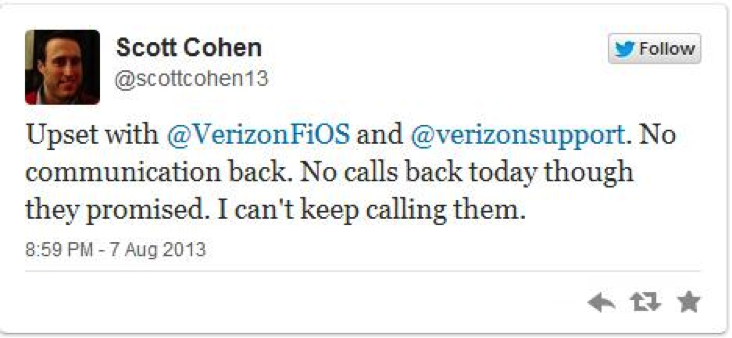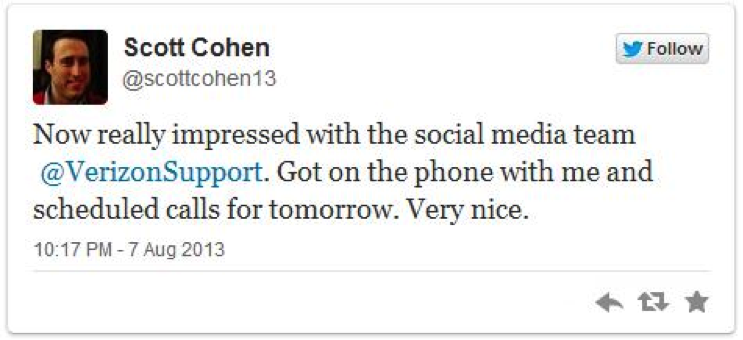Is Social Media Replacing Good Customer Service
"Are companies now relying more on their social media specialists to handle customer service complaints than their customer service departments? Does it take a customer “going public” with their complaints to get proper service?"
Are companies now relying more on their social media specialists to handle customer service complaints than their customer service departments? Does it take a customer “going public” with their complaints to get proper service?
We’ve all been there: Waiting for the cable guy to show up to an appointment. In my case, I had a no-show, only to discover that my order was never in the system (computer glitch). After several attempts to get answers and progress, I took to Twitter:

Long story, short: I got a response from that tweet, and amazing treatment from Verizon’s social media team—including phone calls that they facilitated to get my order expedited and handled.
Long story, shorter: I used social media to get better customer service.
And, this isn’t the first time I’ve used Twitter to get a quicker response. And this time, it got me thinking. It doesn’t seem unusual that this is now the case. Is it simply a response to what could be described as “Squeaky Wheel Syndrome?”
Or, are we looking at social media as a leading customer service channel for the future?
There are myriad articles and blog posts about how social media can be leveraged for marketing. And yet, as this Forbes article from a couple of years ago (and numerous others) points out, customer service is being viewed as “the new marketing.”
If that’s the case, it makes sense that there’s a big place for social channels in terms of customer service. But, should it be the only place I can get good customer service? Absolutely not.
In terms of my experience with Verizon, there are some lessons to be learned:
1. If customers go public (negatively), it’s a breakdown of your customer service experience.
Using the “reasonable person” standard, most people won’t go public with their frustrations until they’re not getting answers. If they’re not getting answers through your traditional customer service channels, you’ve failed due to a breakdown. And no amount of social media presence is going to fix that larger issue.
Which brings me to my next point…
2. Social media shouldn’t replace customer service, but it certainly should augment the whole customer service experience.
I didn’t want to have to tweet about my frustration. Yet, I was extremely impressed with Verizon’s social media team. They were empowered (as all customer service reps should be) to do the research into my issue, make the necessary connections, and virtually “hold my hand” through the experience.
I even tweeted about it:

Yet, as awesome as their social media team was, I came away feeling that the social media team was more empowered than their sales teams to “make things right.” And, harkening back to my first point, I believe that’s a breakdown. You can’t depend on social media to make things right. It’s simply another component of the full customer service experience.
3. Communication is critical.
This goes for all customer service channels. If you tell me you’re going to call me at a certain time, you better call me then. Even if that phone call is simply to tell me you’re still working on the issue and you’ll call me the next day, that’s enough (provided you call me the next day).
Would I be happy? No. But would I be thinking about taking my frustration public? No—but then again, I like to think I’m a reasonable person.
4. Mistakes happen. How you handle them makes the difference between satisfied customer and angry tweeter.
Personally, I don’t like to call out brands for mistakes unless it’s particularly egregious. Others are not so nice. If I had received the calls I was supposed to, or if my order was expedited after the mistake was made, no angry tweet from me.
Simple as that.

 How to resolve AdBlock issue?
How to resolve AdBlock issue? 